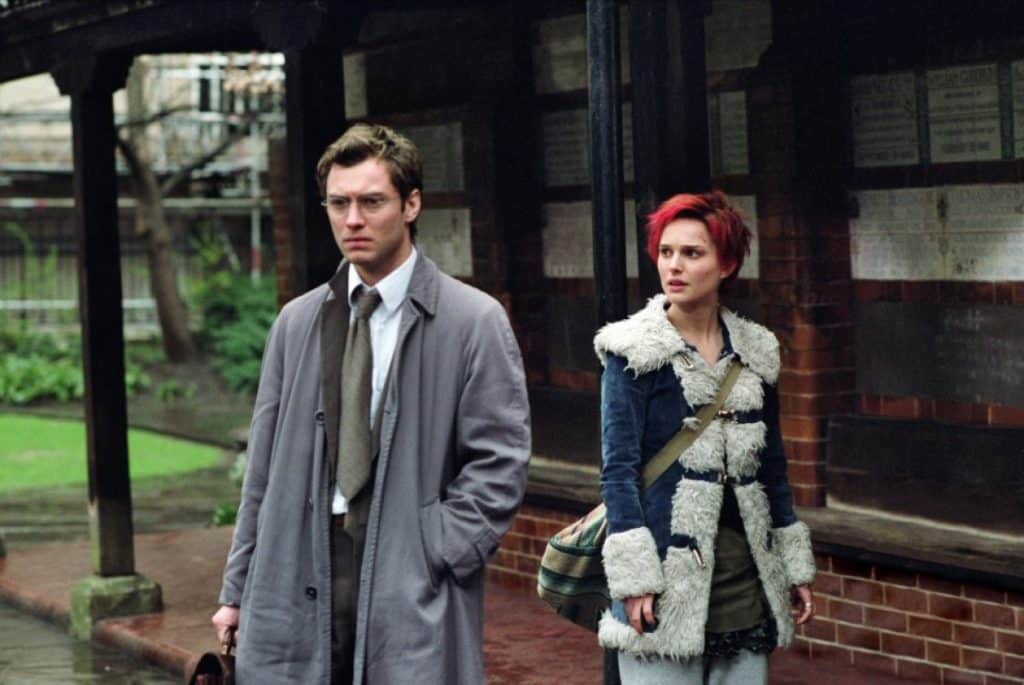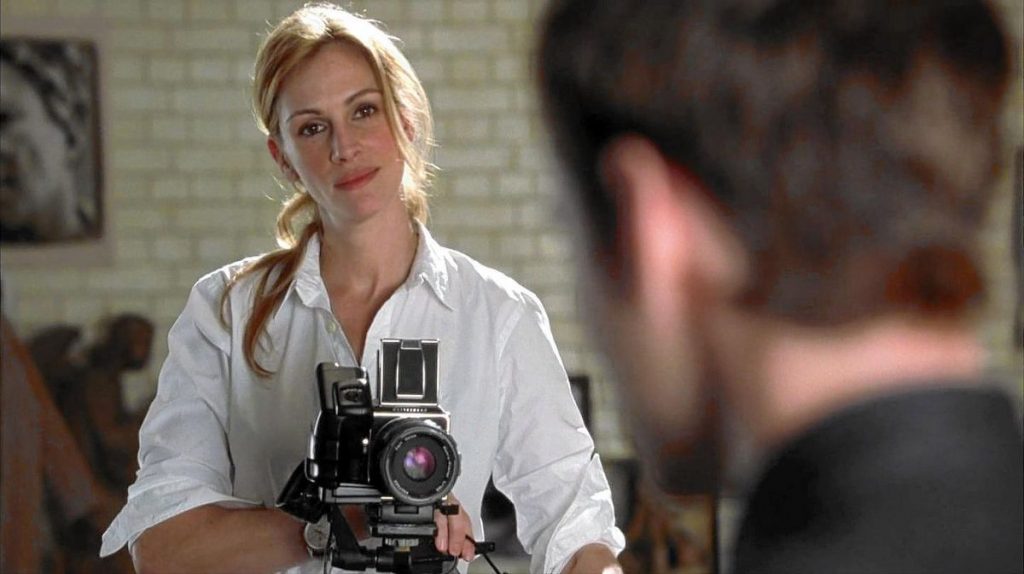Mike Nichols’ searing relationship drama uses words as weapons, and all four leads deploy them expertly.
“Have you ever seen a human heart? It looks like a fist, wrapped in blood!” Larry (Clive Owen) bellows this at Dan (Jude Law) as 2004’s Closer rounds the corner into its final act. As Mike Nichols frames the moment, Owen bellows it at us, the viewers, as well. And why not? It’s a kind of mission statement for the film, which turns fifteen this month. The heart is but a bloody fist. Words are an extension of that gory knotted hand, the weapons wielded to batter and break it in the chests of others.
Many movies employ arguments as surrogate battles, with well-placed barbs and screaming acting as bullets and bombs. Closer does its fair share of that as well. However, the difference comes from the scenes that are ostensibly not about anger or hurt. Even in moments of friendliness and flirtation, the characters of Closer bristle at one another. Each pickup line and come-on is just as likely to be laced with acid as the putdowns and accusations.
Take, for instance, the first meeting of Alice (Natalie Portman) and Dan. Theirs is a twisted sort of meet-cute. As Closer opens, Nichols and cinematographer Stephen Goldblatt seem to be in romantic comedy/fairy tale mode. They train their lens on a bright gauzy seen of the two soon-to-lovers noticing one another, improbably, from afar on a busy London sidewalk. Before they can realize their attraction, however, a car crash interferes. Alice, an American, looked as an American does when crossing the street. In England, however, that approach does no good. Thus, a dustup with a cab. It is, perhaps a bit unsubtly, a foreshadowing of how much these two will bruise each other.

It is not until they finally speak to one another, though, that we’re able to see — and hear — what that car accident gives us a hint of. Their first few lines exchanged boast a kind of classical screwball but for today’s vibe. They joke about the length of wait in the emergency room and have a back and forth about fish and children. The screwball done curdles a moment later, in less than a blink.
Dan: Does it hurt?
Alice (moving from laughter to sharpness immediately): I’ll live.
The moment is almost shocking for its speed. Portman snaps out of a laugh mid-giggle and laces “live” with undeniable venom. She softens to Dan’s offer to put her leg up after that but only ever so slightly. She says please but her tone is one of dominance and vague disdain.
Dan’s no soft victim though. As the scene moves to outside the hospital, Law increasingly teasing out a sense of condescension in how Dan speaks to Alice. By the time he is asking her if she’s on “vacation”, it is unmistakable. She might be bristling but he is toying. In his eyes, she’s a sort of inferior prey. They’re deep into flirting but there’s a strange grimness to it. They’re less searching for sexual chemistry and more prodding for weakness.
Each pickup line and come-on is just as likely to be laced with acid as the putdowns and accusations.
Law takes his condescension into the next scene, staged a year or so later. Now a published author, instead of just an obituary writer, Dan strides into the loft of photographer Anna (Julia Roberts) more fashionable and having ditched glasses for contacts. What was subtle in his scene with Alice has grown less so, probably to keep pace with his increased pride.
Anna, however, is more than equal to him. Whereas Portman gave Alice a sort of armored quick-to-strike feel, Roberts makes Anna a boxer. She reads Dan immediately and goes toe to toe, giving as good as she gets. Consider the moment when Law leans in and barrels down both Anna’s camera and the film lens, another moment where Nichols explicitly makes us part of the movie. Teasingly, Law leans in. Bear in mind this is the act near the peak of his considerable attractiveness in real life and the character as good as he has looked so far in this movie. Roberts, though, responds to him with a clinical coldness.
Dan (in full carnivore mode and stage whisper): Am I a stranger?
Anna (detached): No. You’re a job. And a sloucher. Sit up.
The writer quickly switches tactics then, trying to force her to admit to finding his book either vulgar or titillating. The go back and forth and he briefly gains the upper hand until she, once again, puts him down.
Dan: You read [the book]. Until 4 [in the morning].
Anna: Don’t raise your eyebrows. It makes you look smug.
Again, this is ostensibly a scene of flirtation. In practice, though, it ends up a contest of who can out superior the other.

The fourth member of this love quartet, Larry (Clive Owen), requires the longest to take to this form of communication, this wielding language as a weapon. Cast as the vulgarian of the group, he’s the most straight ahead. (Sidenote: There is something so deliciously British about the doctor being the one of the four who is the Earthiest and most working class-oriented, even as he clearly out-earns them all.) That’s not to say he isn’t capable of cruel words. He certainly is. However, he uses them intentionally and they reflect what he means. He is not one to mask flirtation in condescension or vice versa.
Interestingly, he’s also the only one who ever calls anyone else on their backhanded cruelty. At Anna’s gallery opening, he engages in what he clearly believes to be playful banter with his now-girlfriend. She, however, utilizes it to engage his displacement. Rather than acknowledge her romantic confusion, she turns to undercut Larry with anger.
Anna: You seem more like the cat that got the cream, you can stop licking yourself.
Larry: That is the meanest thing you’ve ever said to me.
In time though, Larry adapts to this approach to verbal expression. The script, and Owen, wisely elect not to make him as verbally dexterous as the other three. He is still, ultimately, a blunt instrument. However, he adopts a cruel cunning to how he talks to others. After his lowest moment, begging Alice to tell him her real name as he spends increasing amounts of money on her, we see him calm and back in control. We quickly learn Anna has returned to him, much to Dan’s despair. Dan (now played with drooping pathos by Law) has come to Larry to ask the doctor to release Anna.
The script, and Owen, wisely elect not to make [Larry] as verbally dexterous as the other three. He is still, ultimately, a blunt instrument.
Owen at first lets Larry go full primal, raging with the piece’s opening quote and disdainfully declaring Dan, “You writer. You liar.” It is exactly what Dan would expect Larry to do. However, then the doctor shifts, becoming a confidante and almost friend to the heartbroken man, guiding him back to Alice. Everything seems to reset, back to the status quo and for the better.
Then, with Owen giving Larry a wonderfully subtle snarl to his voice, the doctor stops Dan just before he leaves to reunite with Alice.
Larry: Dan, I lied to you. I did fuck Alice. Sorry for telling you. I’m just not big enough to forgive you, Buster.
The whole encounter was a con, a work. Larry brought Dan all the way up just to have the pleasure of kicking his legs out from under him. “Buster,” the nickname Alice and Dan used to share, is but the coup de grace, the cherry on top. Larry may not still share the others’ gift of subtlety but he knows how to aim words for the kill shot now.

What’s especially interesting about how Nichols realizes Closer is he makes it clear throughout the film that these people are not representative of the wider world. This is not a movie about a planet of nasty people mixing love and cruelty in every word they speak. Larry’s initial presentation is a nod to that. But the bigger giveaway comes from the music. Nichols, together with music supervisor Darian Pollard, fills the film with gentle bittersweet needle-drops taken from classical music, with two pieces by Mozart and contemporary with Damien Rice’s “The Blower’s Daughter” serving as the unofficial theme.
Closer is wrapped in soft, beautiful tones. Only the film’s darkest scene (Larry’s confrontation with Alice at a strip club) goes aggressive with Prodigy’s “Smack My Bitch Up” — a nod to both how Larry’s words are still in sync with their meaning. It’s dark angry music for a dark angry moment and (it seems Nichols is suggesting) a dark angry place. Otherwise, the music is discordant with the malice of the lead characters.
The subconscious message of it? Closer’s world is a gentle one, a place of kindness. It is these people who are bringing spite into it.